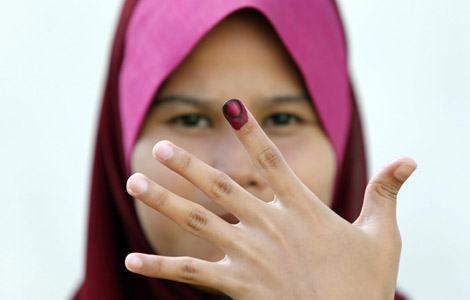Young voters shifts Malaysia election balance
Updated: 2013-04-30 14:26
(Agencies)
|
|||||||||||
 |
|
Malaysian voter Aziana Mad Sin shows her ink-stained finger after casting her ballot during the early voting for the general elections in Kuala Lumpur April 30, 2013.[Photo/Agencies]
|
But Mohammed Bukhairy Mohammed Sofian's quixotic plan to run against Najib -- which he dropped to avoid diverting votes from the main opposition candidate -- was a reminder of how young voters are shaping politics in the Southeast Asian nation as never before and unnerving the long-ruling coalition.
He is one of 2.6 million Malaysians registered to cast their ballots for the first time, making up roughly a fifth of Malaysia's 13.3 million eligible voters. That is much higher than the 638,000 new voters five years ago.
Analysts say an upsurge in interest in politics following the opposition's best-ever election showing in 2008 has driven more young people to register.
Their numbers make young Malaysians a crucial, possibly decisive, source of support in an election that promises to be the closest since independence. They are also a force that could blur the traditional race-based faultlines that have shaped the political landscape in the multi-ethnic country.
An unbroken 56-year grip on power has given the ruling Barisan Nasional coalition control over mainstream media and the ability to spend freely in the election campaign as they preside over a period of strong economic growth.
Although a coalition win with a reduced parliamentary majority is seen as the most likely outcome, the opposition says that the new voters are the "X Factor" that could create Malaysia's biggest electoral shock since independence in 1957.
"I know what young people want. They want a voice and that means change," Bukhairy, a third-year Islamic political science student at Universiti Malaya, told Reuters.
An opposition win would bring unprecedented uncertainty to politics in Malaysia, whose government is the longest serving in the democratic world, and herald a major shake-up in five decades of cosy relations between government and business.
Today's Top News
Three buried after lab explosion
EU to ban pesticides blamed for harming bees
City unites to say farewell
Alibaba buys 18% stake of Weibo
Small stores rely on new retail revolution
Taobao creates new job specifications
Beauties turn entrepreneurs
Flooding season nears in Ya'an
Hot Topics
Lunar probe , China growth forecasts, Emission rules get tougher, China seen through 'colored lens', International board,
Editor's Picks

|

|

|

|

|

|





